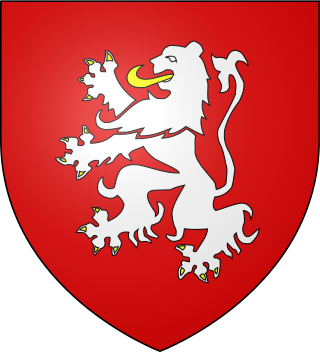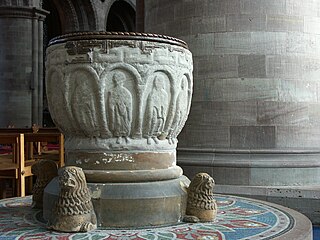
Lincoln Cathedral, Lincoln Minster, or the Cathedral Church of the Blessed Virgin Mary of Lincoln and sometimes St Mary's Cathedral, in Lincoln, England, is a Grade I listed cathedral and is the seat of the Anglican Bishop of Lincoln. Construction commenced in 1072 and continued in several phases throughout the High Middle Ages. Like many of the medieval cathedrals of England, it was built in the Early Gothic style.

Robert Grosseteste, also known as Robert Greathead or Robert of Lincoln, was an English statesman, scholastic philosopher, theologian, scientist and Bishop of Lincoln. He was born of humble parents in Suffolk, but the associations with the village of Stradbroke is a post-medieval tradition. Upon his death, he was revered as a saint in England, but attempts to procure a formal canonisation failed. A. C. Crombie called him "the real founder of the tradition of scientific thought in medieval Oxford, and in some ways, of the modern English intellectual tradition".
Roger le Poer was a medieval Lord Chancellor from 1135 until 1139 for King Stephen of England. The son of a powerful bishop, Roger owed his position to his family connections. He lost his office when his father and other relatives lost power. Arrested along with his father, Roger was used to secure the surrender of a castle held by his mother and then disappeared from history.
Robert of Ghent or Robert de Gant was Lord Chancellor of England and Dean of York in the 12th century. The younger son of a nobleman, Robert was probably a member of the cathedral chapter of York before his selection as chancellor by King Stephen of England in the mid-1140s. He is not mentioned often in documents from his time as chancellor, but why this is so is unknown. He became dean at York Minster around 1147. Robert was slightly involved in the disputes over who would be Archbishop of York in the late 1140s and 1150s, but it is likely that his chancellorship prevented his deeper involvement in diocesan affairs. He was no longer chancellor after the death of Stephen, but probably continued to hold the office of dean until his death around 1157 or 1158.

Ranulf II, 4th Earl of Chester (1099–1153), was an Anglo-Norman baron who inherited the honour of the palatine county of Chester upon the death of his father Ranulf le Meschin, 3rd Earl of Chester. He was descended from the Counts of Bessin in Normandy.

Roger de Beaumont, feudal lord of Beaumont-le-Roger and of Pont-Audemer in Normandy, was a powerful Norman nobleman and close advisor to William the Conqueror.

Roger de Pont L'Évêque was Archbishop of York from 1154 to 1181. Born in Normandy, he preceded Thomas Becket as Archdeacon of Canterbury, and together with Becket served Theobald of Bec while Theobald was Archbishop of Canterbury. While in Theobald's service, Roger was alleged to have committed a crime which Becket helped to cover up. Roger succeeded William FitzHerbert as archbishop in 1154, and while at York rebuilt York Minster, which had been damaged by fire.

Alexander of Lincoln was a medieval English Bishop of Lincoln, a member of an important administrative and ecclesiastical family. He was the nephew of Roger of Salisbury, a Bishop of Salisbury and Chancellor of England under King Henry I, and he was also related to Nigel, Bishop of Ely. Educated at Laon, Alexander served in his uncle's diocese as an archdeacon in the early 1120s. Unlike his relatives, he held no office in the government before his appointment as Bishop of Lincoln in 1123. Alexander became a frequent visitor to King Henry's court after his appointment to the episcopate, often witnessing royal documents, and he served as a royal justice in Lincolnshire.

Revesby Abbey was a Cistercian monastery near the village of Revesby in Lincolnshire, England. The abbey was founded in 1143 by William de Roumare, Earl of Lincoln, and the first monks came from Rievaulx Abbey.
This is a list of High Sheriffs of Lincolnshire.

Stephen of Aumale was Count of Aumale from before 1089 to 1127, and Lord of Holderness.
William Lloyd may refer to:
Roger Weseham was an English medieval Bishop of Coventry and Lichfield.

Robert Foliot was a medieval Bishop of Hereford in England. He was a relative of a number of English ecclesiastics, including Gilbert Foliot, one of his predecessors at Hereford. After serving Alexander, Bishop of Lincoln as a clerk, he became a clerk of Henry of Blois, the Bishop of Winchester and brother of King Stephen of England. He attended the Council of Reims in 1148, where another relative, Robert de Chesney, was elected as Bishop of Hereford. Chesney then secured the office of Archdeacon of Oxford for Foliot.
Robert de Chesney was a medieval English Bishop of Lincoln. He was the brother of an important royal official, William de Chesney, and the uncle of Gilbert Foliot, successively Bishop of Hereford and Bishop of London. Educated at Oxford or Paris, Chesney was Archdeacon of Leicester before his election as bishop in December 1148.
Humphrey de Vieilles was the first holder of the "grand honneur" of Beaumont-le-Roger, one of the most important groups of domains in eastern Normandy and the founder of the House of Beaumont. He was married to Albreda or Alberée de la Haye Auberie.
There have been four baronetcies created for members of the Thorold family of Lincolnshire, two in the Baronetage of England and two in the Baronetage of Great Britain. As of 2014 one creation is extant.
Lucy of Bolingbroke or Lucia Thoroldsdottir of Lincoln was an Anglo-Norman heiress in central England and, later in life, countess of Chester. Probably related to the old English earls of Mercia, she came to possess extensive lands in Lincolnshire which she passed on to her husbands and sons. She was a notable religious patron, founding or co-founding two small religious houses and endowing several with lands and churches.
William Thorold may refer to:
The White Ship disaster on 25 November 1120 claimed the lives of numerous high-ranking people of Norman England.








